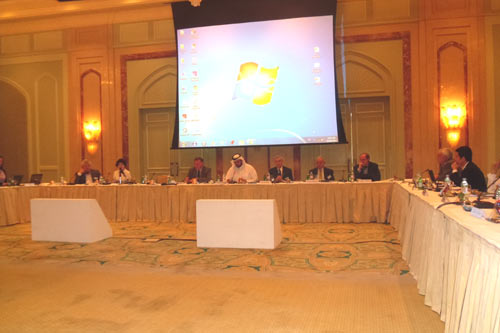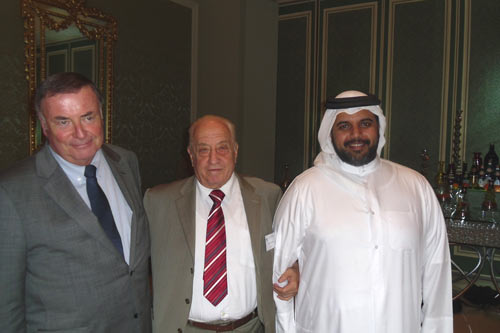MEETING OF WORLD WATER COUNCIL'S BOARD OF GOVERNORS
The 45th Board of Governors meeting of WWC was held in Doha, Qatar, owing to hospitality of the Qatar National Food Security Programme managed by Mr. Fahad Al Attiya.

In his welcome address and report Mr.Fahad Al Attiya stressed that Qatar, being a small country on the Arabian Peninsula with 1.7 million of population and having only 65,000 hectares of arable land, has set a goal to provide them with food though currently most of the food is imported. All the water that comes to irrigation is the subject of desalination: 3.8 million m3 per day or 100 million m3 per year.
Firstly, those who will supply the country with food should be prepared. The country with the biggest American universities established dozens of colleges, universities and training centers. The universities of Carnegie, Georgetown, Texas, Cornell, and others, are involved in the abovementioned activity which is financed by oil and gas companies (Shell, Ekson Mobile, Total, General Electric, etc.). Owing to their efforts and support the Scientific and Technological Park of Qatar was created, which is the center of partnership between industry and academia, and which is developing.
Lack of sources of water suitable for use doesn't frighten citizens of Qatar. Water is a co-product of oil and gas extraction. Each barrel of oil contains 3.4 barrels of water that should be removed and then can be used. Use of that water for animal production and irrigation is a first item of solving the food problem. The second item is the use of solar energy in greenhouses, and generally in clean electricity production. Solar energy is generated at the huge "solar fields" that occupied many hectares.
Desalination of water from the oil-and-gas fields is the Center's activity subject for decrease of desalination cost and environmental security. Desalination cost isn't above one half of dollar for 1 cubic meter of water. Programme includes also production of liquid soluble fertilizers, large-scale construction of greenhouses as well as complete processing of products with aim to refuse imported food after 2035, which currently amounts 90% of all products. Programme also is oriented to local diet. One of the Programme feature is financial stability. It includes subsidizing of agricultural production including irrigation. Everyone of 1340 farmers reports back to the state on implementing technology of crop growing and on their financial situation on the basis of openness, transparency and faithfulness. Each farmer receives financial support on the basis of two rules: the cost of production may not be more than the stated one, and the needed level of reproduction for long-term period, taking into account of formation of capital, should be provided.

The University of Texas (Prof. Patric Linke) in cooperation with the Scientific-and-technological Park of Qatar supervise this Programme.
Qatar with some countries have initiated the creation of "Global Dry Lands Alliance", which includes several countries, including Kazakhstan - one of the former CIS countries.
The Board members were acquainted with the work and structure of the Park.
It should be noted that all the oil-refining and gas-processing companies provide tens of millions of dollars annually for maintaining the Park!
The Board considered the report by L. Fauchon on strengthening activity in the hydrodiplomacy sphere and discussed outcomes of the World Water Forum 6. International Committee of the Forum considers summary of all outcomes and is going to transfer all the outcomes of the Forum to the World Water Council, including:
- " 6 WWF Highlights"
- RIO+20 message on water resources;
- Broadened Istanbul Water Consensus;
- "Village for Solution"
- "Global Water Platform" (209 pages).
The Board submits three principles for review by the World Water Community:
- One of conclusions after local and regional discussions was to address to local governments regarding implementation of financial support mechanism in the form of the Water Solidarity Fund with financing equal to 1% of GDP.
- The World Energy Union and the World Water Council create a working group to monitor the water and energy demands, taking into account demographic situation and climate changes.
- The Right to Water should be committed to national companies, which will revise and improve the national legislations with aim to improve people's well-being.
The Board considered the Message to countries concerning a tender on venue for 8th World Water Forum in 2018.
The Letter of Interest, where good organisation of next Forum is substantiated, should be submitted to the WWC's headquarters in Marseille before 1 November 2012 because the General Assembly of WWC will be held 18-19 November in Marseille. The Board arranged the schedule of preparatory works on development of WWC Policy for three years to be submitted as a first version on 17 September for comments and as a final version on 5 October. In this connection Prof. Dukhovny V.A. stressed the need to prepare the report on implementation of current strategy 2009-2012.
The Board also considered and discussed the financial and management reports of WWC. When approving the financial report the opinion about need of more transparent approval of budget funds received in the form of Water Forum contribution aiming to use of these funds more efficiently for the greater involvement of the participants and the WWC's members into the working groups on implementation of the Strategy and to improve the efficiency of the Council has been expressed.
Amendment in the WWC Statute concerning involvement of young people (18-35 years old) into the Board is proposed, but not approved. It was proposed to deeply analyze this issue and to report back at the next meeting.
Mrs. E.Park and Mr. Dji-Hiu Lim, Representative of the Ministry of Land, Transport and Water of South Korea, have reported measures on preparing to 7 World Water Forum.
Prof. Dukhovny V.A. on behalf of International Water Resources Association reported for IWRA representatives about collaboration with WWC regarding development of integrated programme on improving water resources management with 2 sections: Water Supply Management and Water Demands Management.
The WWC Secretariat disseminated the Note prepared by Prof. Dukhovny V.A. and Dr. Ziganshina D., his vise-director, which includes some recommendations on improving the WWC Board activity based on analysis of past nine years. The Note was approved and positively evaluated by most members of the Board, including President and Vise-President.
Prof. Dukhovny V.A.,
Director of SIC ICWC
|